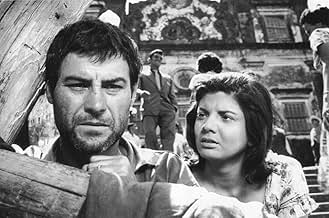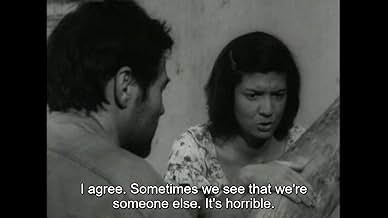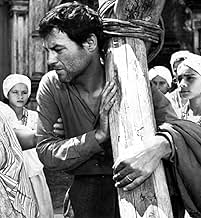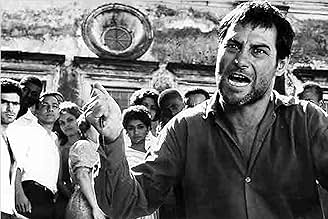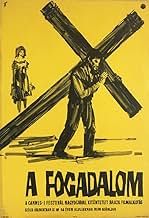O Pagador de Promessas
- 1962
- 1h 38min
VALUTAZIONE IMDb
8,3/10
4368
LA TUA VALUTAZIONE
Aggiungi una trama nella tua linguaA simple yet devout Christian makes a vow to Saint Barbara after she saves his donkey, but everyone he meets seems determined to misunderstand his intentions. Will he be able to keep his pro... Leggi tuttoA simple yet devout Christian makes a vow to Saint Barbara after she saves his donkey, but everyone he meets seems determined to misunderstand his intentions. Will he be able to keep his promise in the end?A simple yet devout Christian makes a vow to Saint Barbara after she saves his donkey, but everyone he meets seems determined to misunderstand his intentions. Will he be able to keep his promise in the end?
- Regia
- Sceneggiatura
- Star
- Candidato a 1 Oscar
- 4 vittorie e 1 candidatura in totale
Leonardo Villar
- Zé do Burro
- (as Leonardo Vilar)
Antonio Pitanga
- Coca
- (as Antonio L. Sampaio)
João Di Sordi
- Police Detective
- (as João Desordi)
Veveldo Diniz
- Sacristão
- (as Velvedo Diniz)
Napoleao Lopes Filho
- Bispo
- (as Napoleão L. Filho)
Recensioni in evidenza
A shame such an important movie has no poster here on IMDb. I wanted to add the one that is used on Wikipedia, but I would have to pay to do that. Strange. (Edit: it has a poster now.)
If you are critical of religion fanaticism, you must see this movie! It shows what can become of fanatic people, how lack of education plays an important role in fanaticism, the arrogance of the church and the hypocrisy of our society.
Zé do Burro (Joe of the Donkey) has the soul of a child. He is a good guy, but extremely naive. His naivety is shamelessly exploited, and people cruelly distort his good intentions, making an evil person out of him, when all he wanted was to do good.
The movie won the Golden Palm in Cannes and other prizes. It's a classic. Dialogs are a bit theatrical (only if you understand Portuguese), but so they used to be that time. A movie that will get under your skin.
If you are critical of religion fanaticism, you must see this movie! It shows what can become of fanatic people, how lack of education plays an important role in fanaticism, the arrogance of the church and the hypocrisy of our society.
Zé do Burro (Joe of the Donkey) has the soul of a child. He is a good guy, but extremely naive. His naivety is shamelessly exploited, and people cruelly distort his good intentions, making an evil person out of him, when all he wanted was to do good.
The movie won the Golden Palm in Cannes and other prizes. It's a classic. Dialogs are a bit theatrical (only if you understand Portuguese), but so they used to be that time. A movie that will get under your skin.
I love to watch old black and white movies and if you look for the history of foreign films up for an Oskar you find some gems like this movie. Such a real Brazilian movie and especially from Salvador de Bahia, the old capital where the cultural history of Brazil (except for the original people) is present. Colonial white oppression, the corrupt white middle class, the African people with their religious cultures and capoeira, the Catholic Church between them but like always only saving it's own position and then simple campesino who embodies the true values of human kind. In a collusion of them all, feasts, religion and fights occur and turn into a spiritual happening, a cruxifiction in which human dignity prevails. A wonderful movie from times when things seems to be clear.
The only old thing about this movie is its release date. It's very contemporary and universal. O Pagador de Promessas (1962) is based on a play written by Dias Gomes and performed for the first time in 1960.
(About the first scene so not really a spoiler) Zé and his wife, Rosa, left their land, in the country, and went to the city so Zé could pay a promise he made for a saint called Santa Bárbara. He promised to carry a wooden cross all the way to the city and enter Santa Bárbara church with it if his best friend was healed by the saint. (Paying promisses is still common in Brazil ).
I won't say why exactly but the priest doesn't let he enters the church.
It might seem a minor conflict, but it's not and it escalates through the narrative in a chocking way to Zé, Rosa and audience.
Through the obstacles, Gomes criticizes many social institutions and Brazilian society as a whole in a brilliant way, mixing comedy with drama, what was totally brought to light in Anselmo's adaptation.
In this path, the acting is really important and it's fantastic.
Leonardo Villar portrays perfectly Zé certainty and naivety; Glória Menezes thought of everything, from the accent to the way of moving and the confusion Rosa shows; Dionísio Azevedo made a perfect traditional priest and everybody else were great in their respective roles, an awesome cast.
The technical features are amazing, the sets, the costume design, Duarte's shots, Chock Fowle cinematography and Gabriel Migliori scores.
What stands out in the movie is the representation of Brazilian Culture, which is what the film defends, the beautiful mix Brazil is, of European, Indian, African and many other cultures.
(About the first scene so not really a spoiler) Zé and his wife, Rosa, left their land, in the country, and went to the city so Zé could pay a promise he made for a saint called Santa Bárbara. He promised to carry a wooden cross all the way to the city and enter Santa Bárbara church with it if his best friend was healed by the saint. (Paying promisses is still common in Brazil ).
I won't say why exactly but the priest doesn't let he enters the church.
It might seem a minor conflict, but it's not and it escalates through the narrative in a chocking way to Zé, Rosa and audience.
Through the obstacles, Gomes criticizes many social institutions and Brazilian society as a whole in a brilliant way, mixing comedy with drama, what was totally brought to light in Anselmo's adaptation.
In this path, the acting is really important and it's fantastic.
Leonardo Villar portrays perfectly Zé certainty and naivety; Glória Menezes thought of everything, from the accent to the way of moving and the confusion Rosa shows; Dionísio Azevedo made a perfect traditional priest and everybody else were great in their respective roles, an awesome cast.
The technical features are amazing, the sets, the costume design, Duarte's shots, Chock Fowle cinematography and Gabriel Migliori scores.
What stands out in the movie is the representation of Brazilian Culture, which is what the film defends, the beautiful mix Brazil is, of European, Indian, African and many other cultures.
It is not a surprise that this movie won the golden palm in Cannes. The story of the man that carry a big and heavy cross as a promise for the healing of his donkey is the simpliest and the most beautiful. The poetic way as it is shown became the film an unforgettable classic, with Zé as the protagonist. For sure, technically it is a pre-historic film, the sound quality and editing is really bad, but it even help the audience to focus what really cares. That is not only about poverty, but about humanity. If you liked Central Station, you can't miss.
This film is great! One of the best movies I have ever seen. About faith, religion, poverty...well, about life and all that surrounds us
Could have been just another sentimental and dishonest movie about human condition but no! It is beautiful and trully rewarding... A Masterpiece, do yourselves a favor and watch this movie!
Could have been just another sentimental and dishonest movie about human condition but no! It is beautiful and trully rewarding... A Masterpiece, do yourselves a favor and watch this movie!
Lo sapevi?
- QuizFirst Brazilian film to be nominated for an Oscar.
- ConnessioniEdited into A Edição do Nordeste (2023)
I più visti
Accedi per valutare e creare un elenco di titoli salvati per ottenere consigli personalizzati
- How long is The Given Word?Powered by Alexa
- Where can I watch this film?
Dettagli
Botteghino
- Lordo in tutto il mondo
- 8229 USD
- Tempo di esecuzione1 ora 38 minuti
- Colore
- Mix di suoni
- Proporzioni
- 1.33 : 1
Contribuisci a questa pagina
Suggerisci una modifica o aggiungi i contenuti mancanti

Divario superiore
By what name was O Pagador de Promessas (1962) officially released in India in English?
Rispondi
